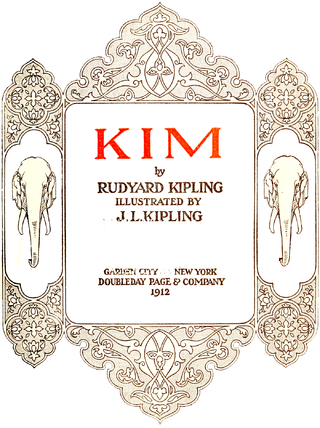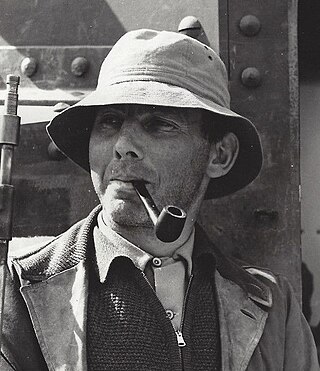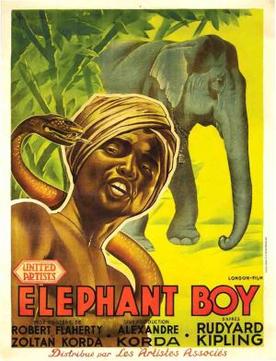
Robert Joseph Flaherty, was an American filmmaker who directed and produced the first commercially successful feature-length documentary film, Nanook of the North (1922). The film made his reputation and nothing in his later life fully equaled its success, although he continued the development of this new genre of narrative documentary with Moana (1926), set in the South Seas, and Man of Aran (1934), filmed in Ireland's Aran Islands. Flaherty is considered the father of both the documentary and the ethnographic film.

Joseph Rudyard Kipling was an English journalist, novelist, poet, and short-story writer. He was born in British India, which inspired much of his work.
This is a bibliography of works by Rudyard Kipling, including books, short stories, poems, and collections of his works.

Captains Courageous: A Story of the Grand Banks is an 1897 novel by Rudyard Kipling that follows the adventures of fifteen-year-old Harvey Cheyne Jr., the spoiled son of a railroad tycoon, after he is saved from drowning by a Portuguese fisherman in the North Atlantic. The novel originally appeared as a serialisation in McClure's, beginning with the November 1896 edition with the last instalment appearing in May 1897. In that year, it was published in its entirety as a novel, first in the United States by Doubleday, and a month later in the United Kingdom by Macmillan. It is Kipling's only novel set entirely in North America. In 1900, Teddy Roosevelt extolled the book in his essay "What We Can Expect of the American Boy", praising Kipling for describing "in the liveliest way just what a boy should be and do".

Kim is a novel by Nobel Prize-winning English author Rudyard Kipling. It was first published serially in McClure's Magazine from December 1900 to October 1901 as well as in Cassell's Magazine from January to November 1901, and first published in book form by Macmillan & Co. Ltd in October 1901. The novel is notable for its detailed portrait of the people, culture, and varied religions of India. "The book presents a vivid picture of India, its teeming populations, religions, and superstitions, and the life of the bazaars and the road." The story unfolds against the backdrop of the Great Game, the political conflict between Russia and Britain in Central Asia. The novel popularized the phrase and idea of the Great Game.

"The Man Who Would Be King" (1888) is a story by Rudyard Kipling about two British adventurers in British India who become kings of Kafiristan, a remote part of Afghanistan. The story was first published in The Phantom 'Rickshaw and Other Tales (1888); it also appeared in Wee Willie Winkie and Other Child Stories (1895) and numerous later editions of that collection. It has been adapted for other media a number of times.

Mowgli is a fictional character and the protagonist of the Mowgli stories featured among Rudyard Kipling's The Jungle Book stories. He is a feral boy from the Pench area in Seoni, Madhya Pradesh, India, who originally appeared in Kipling's short story "In the Rukh" and then became the most prominent character in the collections The Jungle Book and The Second Jungle Book (1894–1895), which also featured stories about other characters.

The Jungle Book is an 1894 collection of stories by the English author Rudyard Kipling. Most of the characters are animals such as Shere Khan the tiger and Baloo the bear, though a principal character is the boy or "man-cub" Mowgli, who is raised in the jungle by wolves. Most stories are set in a forest in India; one place mentioned repeatedly is "Seeonee" (Seoni), in the central state of Madhya Pradesh.

The Second Jungle Book is a sequel to The Jungle Book by Rudyard Kipling. First published in 1895, it features five stories about Mowgli and three unrelated stories, all but one set in India, most of which Kipling wrote while living in Vermont. All of the stories were previously published in magazines in 1894–5, often under different titles. The 1994 film The Jungle Book used it as a source.

"Shooting an Elephant" is an essay by British writer George Orwell, first published in the literary magazine New Writing in late 1936 and broadcast by the BBC Home Service on 12 October 1948.

George Peress Sanderson was a British naturalist who worked in the public works department in the princely state of Mysore. He began a system for capturing wild elephants that were destructive to agriculture so as to use them in captivity. He was known in the popular press as the "Elephant King" and wrote a book on his life in the forests of India. Rudyard Kipling is believed to have modelled the character "Petersen Sahib" in his Toomai of the elephants after him.

Sabu Dastagir was an Indian actor who later gained United States citizenship. Throughout his career he was credited under the name Sabu and is primarily known for his work in films during the 1930s–1940s in Britain and the United States. He was inducted into the Hollywood Walk of Fame in 1960.
Elephant Boy may refer to:

Zoltan Korda was a Hungarian-born motion picture screenwriter, director and producer. He made his first film in Hungary in 1918, and worked with his brother Alexander Korda on film-making there and in London. They both moved to the United States in 1940 to Hollywood and the American film industry.

Elephant Boy is a 1937 British adventure film starring Indian-born actor Sabu in his film debut. Documentary filmmaker Robert J. Flaherty, who produced some of the Indian footage, and supervising director Zoltan Korda, who completed the film, won the Best Director Award at the Venice Film Festival. The film was made at the London Films studios at Denham, and in Mysore, India, and is based on the story "Toomai of the Elephants" from Rudyard Kipling's The Jungle Book (1894).

Kim is a 1950 adventure film made in Technicolor by Metro-Goldwyn-Mayer. It was directed by Victor Saville and produced by Leon Gordon from a screenplay by Helen Deutsch, Leon Gordon and Richard Schayer, based on the classic 1901 novel of the same name by Rudyard Kipling.
"In the House of Suddhoo" is a short story by Rudyard Kipling. The story was published in the Civil and Military Gazette on April 30, 1886 under the title "Section 420, I.P.C.". Its first appearance in book form was in the first Indian edition of Plain Tales from the Hills in 1888. It was the third of the stories that appear in that collection to be written

"The King's Pilgrimage" is a poem and book about the journey made by King George V in May 1922 to visit the World War I cemeteries and memorials being constructed at the time in France and Belgium by the Imperial War Graves Commission. This journey was part of the wider pilgrimage movement that saw tens of thousands of bereaved relatives from the United Kingdom and the Empire visit the battlefields of the Great War in the years that followed the Armistice. The poem was written by the British author and poet Rudyard Kipling, while the text in the book is attributed to the Australian journalist and author Frank Fox. Aspects of the pilgrimage were also described by Kipling within the short story "The Debt" (1930).
Filmmakers and others have made many adaptations of The Jungle Book stories by Rudyard Kipling. The stories, inspired by Kipling's life in India, were published in the 1894 The Jungle Book and its 1895 sequel, The Second Jungle Book.














